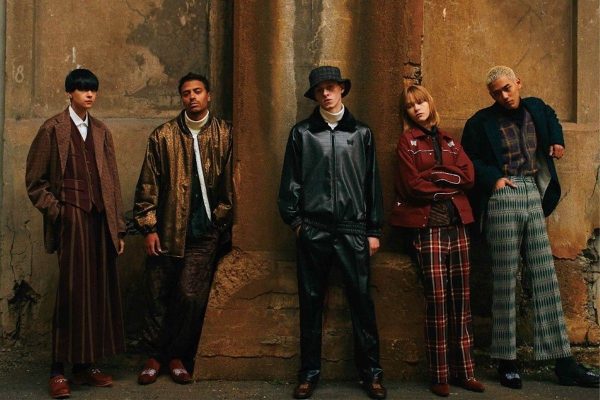
Japan has established a longstanding association with avant-garde fashion, wherein the fusion of contemporary aesthetics and traditional elements produces an exceptionally varied and distinctive array of clothing labels. Japanese clothing brands, encompassing innovative fashion houses as well as minimalist designs, have exerted a substantial influence on the international fashion arena. This article will delve into the details of several well-known Japanese fashion labels, exploring their unique designs, innovative approaches, and meticulous craftsmanship.
Japanese Clothing Brands
Comme des Garcons
Rei Kawakubo founded Comme des Garcons in 1969, and the fashion house has gained widespread recognition for its avant-garde creations. The brand consistently defies conventional notions of beauty and style, pushing the boundaries of traditional fashion. Comme des Garcons presents an extensive assortment of apparel, encompassing the avant-garde main line, Comme des Garcons Play, which draws inspiration from subculture, and the upscale Comme des Garcons Homme.
Issey Miyake
Established in 1970 by the illustrious designer Issey Miyake, Issey Miyake is renowned for its groundbreaking technology and fusion of traditional Japanese craftsmanship. The brand’s signature feature is pleats, which impart both texture and functionality to its creations. Issey Miyake’s apparel captivates the international fashion community with its enduring sophistication and frequent integration of innovative fabric techniques.
UNIQLO
UNIQLO, an acronym that translates to “unique clothing,” has achieved worldwide recognition due to its reasonably priced yet premium essentials. The clothing brand founded in 1984, is well-known for its functional and minimalist designs. The brand offers a wide range of casual wear, including denim, comfortable t-shirts, and exciting collaborations with Jil Sander and Christophe Lemaire. Owing to its steadfast dedication to quality, affordability, and simplicity, UNIQLO has amassed an enormous and devoted global customer base.
Sacai
Established in 1999 by Chitose Abe, Sacai has gained fame for its adeptness in hybrid fashion—as it combines contrasting fabrics, textures, and styles in a cohesive fashion progression. Sacai’s designs frequently feature deconstructed silhouettes and unexpected color combinations, creating a visual feast. By collaborating with fashion industry titans, the brand has firmly established itself as a significant participant in the avant-garde fashion world.
Undercover
Established in 1990 by Jun Takahashi, Undercover has gained renown for its unconventional approach to streetwear and defiant ethos. The brand frequently fuses Japanese aesthetics with punk influences to create apparel that is rebellious, unconventional, and thought-provoking. The runway presentations of Undercover are renowned for their dramatic nature, which enhances the visual narrative of the brand’s apparel.
A Bathing Ape (BAPE)
A Bathing Ape popularly known by its acronym BAPE, has established a distinct presence within the realm of subculture. BAPE has achieved synonymy within urban fashion culture due to its renowned primate logo and emblematic camouflage patterns. Partnerships with prominent figures and brands have significantly enhanced BAPE’s standing as a vanguard in the realm of street fashion, both domestically and globally.
Wtaps
Wtaps, pronounced “double taps,” is a Japanese streetwear label that is influenced by the trappings of the military. Established by Tetsu Nishiyama, Wtaps is an establishment that merges utilitarian design with a discernible urban aesthetic. Military-inspired silhouettes, meticulous attention to detail, and superior craftsmanship distinguish this brand as a favorite among individuals in search of a rugged yet fashionable appearance.
Frequently Asked Questions Regarding Japanese Clothing Brands
1: What makes Japanese clothing brands unique?
Japanese clothing brands are renowned for their unique blend of tradition, innovation, and meticulous attention to detail. They often prioritize quality craftsmanship, cutting-edge design, and a commitment to both comfort and style, setting them apart in the global fashion landscape.
2: Where can I find Japanese clothing brands outside of Japan?
Many Japanese clothing brands have expanded their presence globally. You can find them in flagship stores, department stores, and boutiques in major cities around the world. Additionally, online platforms and international retailers often carry a selection of Japanese brands, making them accessible to a broader audience.
3: Are Japanese clothing brands expensive?
The pricing of Japanese clothing brands varies. While some brands, especially those associated with high fashion and avant-garde designs, may have higher price points, others like Uniqlo offer affordable and accessible options. Japanese brands cater to a diverse range of budgets, providing options for both luxury and everyday wear.
4: What is the significance of collaborations in Japanese fashion?
Collaborations are a significant aspect of Japanese fashion culture. Many Japanese brands collaborate with artists, designers, and other brands to create limited-edition collections. These collaborations often result in unique and highly sought-after pieces, showcasing the brand’s versatility and creativity.
5: Which Japanese clothing brands are known for minimalist fashion?
Uniqlo is a prominent Japanese brand known for its minimalist aesthetic and focus on essential wardrobe pieces. Other brands like Issey Miyake also incorporate minimalist elements into their designs, emphasizing clean lines and simplicity.
6: Are Japanese clothing brands sustainable?
Sustainability is gaining importance in the Japanese fashion industry. Some Japanese brands, such as Issey Miyake and Uniqlo, have made efforts to incorporate sustainable practices. However, the level of sustainability can vary, so it’s advisable to check individual brand initiatives and practices.
7: What are some popular Japanese streetwear brands?
Japanese streetwear has gained global recognition, with brands like A Bathing Ape (BAPE), Wtaps, and Neighborhood leading the way. These brands are known for their urban aesthetics, unique designs, and collaborations with street culture influences.
8: Can I buy Japanese clothing brands online?
Yes, many Japanese clothing brands have online stores and international e-commerce platforms often carry their products. Websites and online marketplaces provide a convenient way to access a wide range of Japanese fashion, especially for those outside of Japan.
9: Do Japanese clothing brands cater to all body types?
Japanese apparel businesses provide a variety of sizes, however Western and Japanese sizing standards can vary. Before buying, examine sizing charts and reviews because some brands fit more snugly.
10: Are Japanese fashion trends suitable for all cultures?
Japanese fashion trends are diverse and can appeal to a broad range of cultures. While avant-garde and streetwear designs may be niche, many Japanese businesses offer timeless and versatile pieces that can match many fashion choices and cultural backgrounds.
Final Words
Japanese clothing firms have made a lasting impact on the international fashion industry through their distinctive fusion of innovation, tradition, and avant-garde design. From Comme des Garçons’ creative runways to UNIQLO’s everyday simplicity, each brand adds to Japan’s rich fashion tapestry. As these brands continue to attract audiences throughout the world, it’s clear that Japan’s impact on the fashion industry will endure, influencing future generations of designers and fashion aficionados alike. For individuals who value the artistry and craftsmanship of fashion, Japanese clothing brands provide a varied and captivating selection, catering to both those inclined towards avant-garde aesthetics and those in search of commonplace comfort.

Leave a Reply